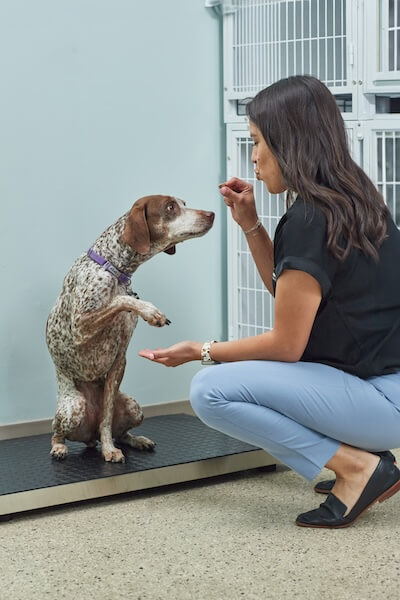
Bringing your pet to Germany? We’ve handled an incredible amount of pet exports to countries in the EU — let us help with yours.
Traveling to Germany with your pet is similar to that of other countries within the European Union. However, if you’re unfamiliar with those, the process can still feel overwhelming.
Our step-by-step guide breaks down each part of the process for you, including when to call in the professionals to make your pet’s trip as stress-free as possible.
Eligible Pets and Country Restrictions
Germany has both country-wide and regional breed bans on certain dogs. Travel requirements can vary from there depending on the pet’s origin point.
Eligible Pets
Germany has had a countrywide ban on the following dog breeds since 2001:
- Pit Bull Terrier
- American Staffordshire Terrier
- Staffordshire Bull Terrier
- Bull Terrier
The country’s federal states may have additional bans in effect. Hamburg, for example, has an active ban on any dog exhibiting fighting characteristics, including mastiffs, rottweilers, and the Fila Brasileiro.
These are dogs Germany has classified as potentially dangerous, and bans include crosses of these breeds. There are a few exceptions, though.
Dogs on banned breed lists can be brought into Germany if they belong to tourists staying in Germany for under 4 weeks, or if they’re returning to an owner who has permission to keep them. Working dogs, such as search and rescue dogs or service dogs, may also be exempt from bans.
The owner must still show original documents to prove the dog is the same one covered by the permit, and dogs with a clear working purpose need proof of that role.
Approved Countries
Germany does not have an approved list of countries eligible for pet import, but import requirements vary depending on the origin country’s rabies risk. If your pet is coming from countries considered high risk for rabies, they may need a blood titer test.
The U.S. is considered a listed third country for bringing pets into Germany and the broader European Union, which means they don’t need rabies titers for travel. Rules for pets traveling from and within the EU are even more generous.Pets traveling within the EU may do so on a pet passport. An EU Pet Passport is an official document used for traveling with pets. It confirms that your pet meets all health and identification requirements for travel, especially rabies vaccination.
Planning an international flight for your pet? We can help.
Microchip and Vaccinations
Your pet needs to be microchipped and up-to-date on their rabies vaccinations without any lapses in coverage to meet import requirements for Germany.
Microchip
Pets should be microchipped before or at the same time as their rabies vaccinations. We always recommend that microchips comply with International Organization for Standardization (ISO) standards. ISO-compliant microchips can be read by universal scanners.
If microchips are not ISO-compatible or difficult to scan, you will need to travel with a microchip scanner for entry into Germany. Microchip information should appear (and match) across all relevant health certificates.
Vaccinations
Pets traveling to Germany need proof of their rabies vaccinations. Pets receiving their first vaccine, whether that’s a primary vaccine or a round of vaccinations after a lapse in coverage, must wait 21 days after their vaccination before traveling.
Vaccines are valid for one year. Pets should be at least 12 weeks old when receiving their first vaccinations. Three-year booster vaccinations are accepted as long as they were given within one year of a primary rabies vaccination. Your pet’s vaccinations won’t be valid if they come before your pet is microchipped.
There are no additional requirements as far as vaccines are concerned, but your vet may have additional vaccine recommendations. In Germany, that generally includes protection against distemper, hepatitis, leptospirosis, parainfluenza, and parvovirus (DHLPP) for dogs.
Recommended vaccines for cats include feline viral rhinotracheitis (FVR), calicivirus, and panleukopenia (feline distemper).

Blood Tests and Treatments
Pet import requirements vary depending on the animal’s origin point. If you’re coming from the U.S. or another EU-listed country like Canada or Australia, your pet won’t need any additional tests or treatments.
For pets coming from unlisted countries, or countries with a higher rabies risk, the process involves a few extra steps. In addition to microchipping, rabies vaccination, and health certificates, they’ll need a rabies titer done at an EU-approved laboratory.
Additional requirements may apply if you’re traveling somewhere other than Germany on trips to the EU. Dogs traveling to Finland, Malta, Ireland, or Norway after entering the EU must be treated for tapeworms, for example. Professional pet relocation services can help you navigate all of these regulations with ease.
Import Documents
IPets traveling to Germany from the EU can do so on a pet passport. If you’re traveling from the U.S., your pet will need one of 2 types of international health certificates, the “non-commercial” or “commercial.” Both versions must be completed by an accredited vet and endorsed by the USDA.
There are no additional import permit requirements, but the airline may request additional documentation for traveling pets.
Non-Commercial
To be classified as a non-commercial move, the pet’s owner or a designated person must be traveling from the origin to the destination within 5 days of the pet’s arrival.Proof of travel—such as an e-ticket or flight itinerary—must be provided to Customs upon arrival.
The Non Commercial Health Certificate , issued by a USDA-accredited veterinarian, is valid for 30 days, but they must also be officially endorsed by your local USDA office within 10 days of departure. Keep in mind, there is a gap between vet issuance and USDA endorsement.

Commercial
Commercial health certificates are used when a pet is flying without its owner. This is common for rehoming or selling pets, but it also applies if you can’t reunite with your pet within 5 days of their arrival.
These certificates are only valid for 48 hours after being issued, so they must be endorsed by the USDA within that short window. Keep in mind that USDA offices only process export certificates Monday-Friday.

Airline Options
Lufthansa is the only airline that flies pets directly to Germany from the U.S. Pets can fly as carry-on, as excess baggage in the passenger aircraft’s cargo hold, or as air freight via Lufthansa Cargo. In-cabin travel is limited to smaller cats and dogs under 8 kg, including their carrier, with the exception of service dogs.
Service dogs are welcome in-cabin at no extra charge, as long as they meet documentation requirements; larger pets must travel as cargo. This can happen as excess baggage on your flight or on a separate cargo flight.
At Tailwind, we prefer to book our clients’ pets in the cargo hold. It typically means the most direct flight to their destination country. The most efficient routes are generally the safest routes.
Lufthansa has additional rules around certain dog breeds. Animals classified as fighting or dangerous dogs must travel in special reinforced crates in the cargo hold unless they’re between 3 and 6 months old. (Puppies can travel in standard IATA-compliant crates or kennels.) Keep in mind that German breed bans apply here, too.
Snub-nosed breeds are limited to in-cabin travel or air freight. They may not travel in the cargo hold of the passenger’s aircraft.
Quarantine
There is no quarantine requirement for pets traveling to Germany, as long as they meet all import regulations for customs clearance. Pets with a layover at Frankfurt Airport have access to Lufthansa’s Frankfurt Animal Lounge as part of their travel plans.
This isn’t a quarantine facility, but a specialized hub for animals in transit to make sure they’re safe, comfortable, and well-cared-for during their journey. For pet owners, the facility offers peace of mind.
Pets are housed in climate-controlled areas, receive fresh food and water, and are monitored by trained handlers and vets. They’re given time to rest and recover between flights, and any specific needs, including veterinary services, are managed on-site. The facility is large enough to offer species-appropriate accommodations.
For a sneak peek, watch this video with footage from the facility.
Pet Passport for EU Residents
If your pet is traveling to Germany from another EU country like Austria, Portugal, or Spain, a valid EU Pet Passport is all you need to be border-check ready. This passport proves your pet is microchipped and vaccinated against rabies, and it’s recognized across all EU member states.
Pet passports are not available for pets coming from the U.S. Any passports issued to residents of the United Kingdom are no longer valid for travel within the EU, as the UK is now a non-EU country.
The purpose of pet passports is to simplify travel around the EU and member states that recognize them as a suitable alternative to health certificates. As long as rabies shots are current and listed in the passport, no additional paperwork or vet visits are required before travel.
The passport must be issued by an authorized EU veterinarian, and it stays valid as long as rabies boosters are kept up to date.EU Pet Passports remain valid for pets who have spent time in the U.S., as long as rabies vaccines remain current. If your pet gets a rabies booster in the U.S. before their return to Germany, they’ll need an EU health certificate before travel, even if they have a pet passport.
How Tailwind Can Help
We understand that planning a pet’s relocation, especially across international borders, is anything but easy. It’s natural to feel overwhelmed by the paperwork and timing of it all. That’s where we come in.
At Tailwind, we can guide you through your pet’s journey abroad. That includes door-to-door service to your pet’s new home. We can ensure not just your peace of mind but your pet’s comfort and safety every step of the way.

Ready to get started? Each pet relocation situation is different, so to get an idea of the costs involved, fill out a quote request.
See What Our Clients Have to Say

“I can’t say enough good things about Tailwind Global Pets! I reached out to them at the very last minute, feeling overwhelmed and unsure if things would come together for my pet’s travel. But the Tailwind team went above and beyond to support me.
Even when our paperwork fell apart right before the move, they stepped in and sorted everything out—calmly, quickly, and with such professionalism. Their boarding facility was excellent, and every single person I interacted with was kind, patient, and genuinely understanding.
Thanks to Tailwind, my pet is now safe and happy at home with me. I truly don’t know what I would have done without them. If you’re moving with a pet and want peace of mind, Tailwind is the team you want in your corner.”
– Jayzee

“Excellent service, good treatment of my pets Kiara and Niña, very diligent in the documentation that was required and when it came to delivering my two dogs it was very simple, thank you very much and highly recommended.”
– Andrés C.
